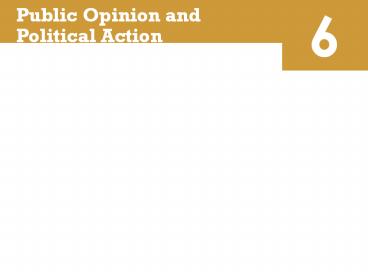Public Opinion and Political Action - PowerPoint PPT Presentation
Title:
Public Opinion and Political Action
Description:
6 Public Opinion and Political Action * America is often called a melting pot because of the way immigrants from all over the world assimilate into American culture. – PowerPoint PPT presentation
Number of Views:113
Avg rating:3.0/5.0
Title: Public Opinion and Political Action
1
6
Public Opinion and Political Action
2
The American People
6
- Immigrant Society
- American Melting Pot
- Regional Shift
- Graying of America
3
Immigrant Society
6
- A nation of nations
- 1 million legal immigrants/year
- 500,000 illegal immigrants/year
- 12 of residents foreign-born
- Waves of immigration
- Northwest Europe (English, Irish, Scottish,
Germans, Scandinavians) - Southern and Eastern Europe (Italians, Jews,
Poles, Russians) - Hispanics (Cuba, Central America, Mexico)
- Asians (Vietnam, Korea, Philippines, India)
4
Immigrant Society
6
- Restrictions on immigration
- Open door policy
- Criminals, prostitutes, lunatics, diseased (1875)
- Chinese Exclusion Act (1882)
- Johnson-Reid Immigration Act (1924)
- Hart-Celler Immigration and Nationality Act
(1965) - Family integration good or bad idea?
5
American Melting Pot
6
- Minority majority
- Hispanic population growing rapidly
6
American Melting Pot
6
- Reluctant immigrants
- 13 of population
- 26 still live in poverty
- Political power increasing
- Simpson-Mazzoli Act (1986)
7
Regional Shift
6
- Northeast most populous
- West and South growing since WWII
- Sun Belt migration
- Arizona, Texas, Florida
- Political power of these areas increasing
- Reapportionment
- Once each decade, after census
8
How Americans Learn About Politics Political
Socialization
6
- Process of Political Socialization
- Political Learning over a Lifetime
9
Process of Political Socialization
6
- Civics class tip of iceberg
- Family
- Central role
- Time and emotional commitment
- Mass media
- The new parents (and teachers)
- Age gap in following politics
- School
- Forming civic virtue
10
Political Learning over a Lifetime
6
- Increasing participation with age
- Party identification strengthens
- Political behaviour is learned
11
Measuring Public Opinion and Political Information
6
- How Polls Are Conducted
- Role of Polls in American Democracy
- What Polls Reveal About Americans Political
Information - Decline of Trust in Government
12
How Polls Are Conducted
6
- Sample
- Random sample
- Sampling error
- Random digit dialing
- Cell phones
- Internet polling
13
Roll of Polls in American Democracy
6
- Polling as a tool for democracy pros and cons
- Gauge opinion between elections
- Following rather than leading
- Pandering or shaping?
- Bandwagon effect
- Exit polls
- Affect election results
- Question wording
14
What Polls Reveal About Americans Political
Information
6
- Americans are uninformed
- Jeffersonian faith in wisdom of common people
unfounded - Young people most uninformed
- Who is responsible for the ill-informed
electorate? - Is it the schools fault?
- Is it the medias fault?
- Paradox of mass politics
15
Decline of Trust in Government
6
- The great slide
- Vietnam War
- Watergate
- Economy/hostage crisis
- Is public cynicism good?
- Negative effect on programs for poor
16
What Americans Value Political Ideologies
6
- Who Are the Liberals and Conservatives?
- Do People Think in Ideological Terms?
17
Who Are the Liberals and Conservatives?
6
- Conservatives dominate
- 41 conservative/21 liberal
- Younger people less conservative
- Minorities less conservative
- Wealthy more conservative
- Gender gap
- Religious more conservative
18
Do People Think in Ideological Terms?
6
- Types of voters
- Ideologues
- Group benefits
- Nature of the times
- No issue content
- Ideology of limited importance
- Seen as threat to family
19
How Americans Participate in Politics
6
- Conventional Participation
- Protest as Participation
- Class, Inequality, and Participation
20
Conventional Participation
6
- Conventional participation
- Voting
- Running for office
- Collecting signatures for a petition
- Unconventional participation
- Protesting
- Civil disobedience
- Violence
21
Protest as Participation
6
- Drawing attention
- Protests attract the media
- Rare
- Civil disobedience
- Breaking unjust laws
22
Class, Inequality, and Participation
6
- Higher socio-economic status higher
participation rates - Minorities vote at nearly equal levels
- What are the policy implications of lower
political participation?
23
Understanding Public Opinion and Political Action
6
- Public Attitudes Toward the Scope of Government
- Democracy, Public Opinion, and Political Action
24
Public Attitudes Toward the Scope of Government
6
- Should government do more or less?
- In peacetime, most Americans say less
- But public opinion is complex and inconsistent
- Ideological conservatives
- Operational liberals
- Policy gridlock
25
Democracy, Public Opinion, and Political Action
6
- Representative democracy
- Decide who governs
- Is public fit to choose its leaders?
- Yes and no































